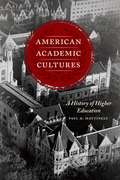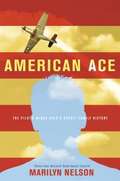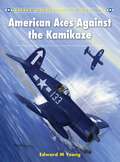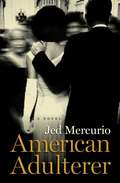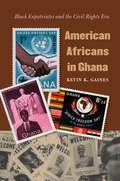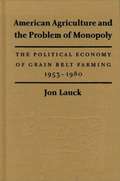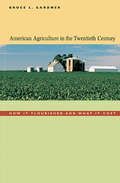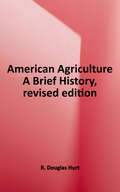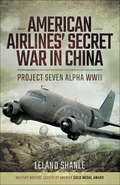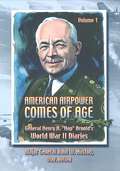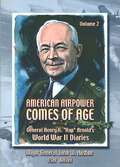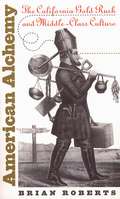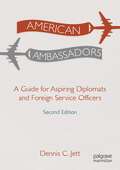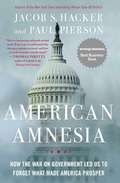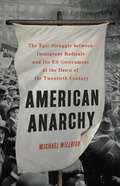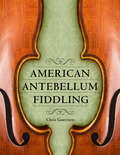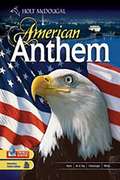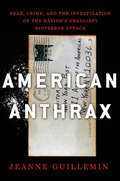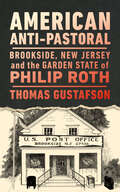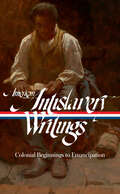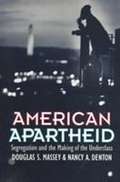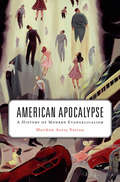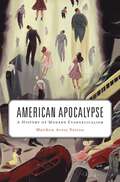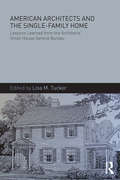- Table View
- List View
American Academic Cultures: A History of Higher Education
by Paul H. MattinglyAt a time when American higher education seems ever more to be reflecting on its purpose and potential, we are more inclined than ever to look to its history for context and inspiration. But that history only helps, Paul H. Mattingly argues, if it’s seen as something more than a linear progress through time. With American Academic Cultures, he offers a different type of history of American higher learning, showing how its current state is the product of different, varied generational cultures, each grounded in its own moment in time and driven by historically distinct values that generated specific problems and responses. Mattingly sketches out seven broad generational cultures: evangelical, Jeffersonian, republican/nondenominational, industrially driven, progressively pragmatic, internationally minded, and the current corporate model. What we see through his close analysis of each of these cultures in their historical moments is that the politics of higher education, both inside and outside institutions, are ultimately driven by the dominant culture of the time. By looking at the history of higher education in this new way, Mattingly opens our eyes to our own moment, and the part its culture plays in generating its politics and promise.
American Ace
by Marilyn NelsonThis riveting novel in verse, perfect for fans of Jacqueline Woodson and Toni Morrison, explores American history and race through the eyes of a teenage boy embracing his newfound identity Connor's grandmother leaves his dad a letter when she dies, and the letter's confession shakes their tight-knit Italian-American family: The man who raised Dad is not his birth father. But the only clues to this birth father's identity are a class ring and a pair of pilot's wings. And so Connor takes it upon himself to investigate--a pursuit that becomes even more pressing when Dad is hospitalized after a stroke. What Connor discovers will lead him and his father to a new, richer understanding of race, identity, and each other.From the Hardcover edition. Award finalist and Newbery Honor winner, has crafted a masterwork that combines contemporary fiction and history in a unique and thought-provoking way.From the Hardcover edition.
American Aces against the Kamikaze
by Edward Young Mark StylingThe Japanese High Command realized that the loss of Okinawa would give the Americans a base for the invasion of Japan. Its desperate response to the invasion of Okinawa was to unleash the full force of the Special Attack Units, known in the west as the Kamikaze ('Divine Wind'), in the hope of inflicting punishing casualties on the US Pacific fleet that in turn disrupted the invasion. In a series of mass attacks in between April and June 1945, more than 900 Kamikaze aeroplanes were shot down. Conventional fighters and bombers accompanied the Special Attack Units as escorts, and to add their own weight to the attacks on the US fleet. In the air battles leading up to the invasion of Okinawa, as well as those that raged over the island in the three months, that followed, and in strikes on Japanese airfields in Kyushu (the base of the Special Attack Units), the Japanese lost more than 7000 aircraft both in the air and on the ground. In the course of the fighting, 67 Navy, 21 Marine, and three USAAF pilots became aces, destroying at least five aircraft between March and June 1945. In many ways it was an uneven combat. While many regular Japanese Army and Navy aviators volunteered for the Special Attack Units, a large number of the pilots in the Special Attack Units were inexperienced and only recently out of flying training. They also often flew obsolete aircraft. These less experienced pilots were no match for the Hellcat, Corsair and Thunderbolt pilots who were at the peak of their game. Indeed, many of the latter had been flying fighters for two or more years, and had previous combat experience. On numerous occasions following these uneven contests, American fighter pilots would return from combat having shot down up to six Japanese aeroplanes during a single mission. Indeed, during the campaign 13 Navy, five Marine Corps and two USAAF pilots became 'aces in a day'.
American Adulterer
by Jed MercurioAn explosive, provocative novel about the life and times-and sexual dalliances-of John F. Kennedy during his administration.
American Africans in Ghana
by Kevin K. GainesIn 1957 Ghana became one of the first sub-Saharan African nations to gain independence from colonial rule. Over the next decade, hundreds of African Americans--including Martin Luther King Jr., George Padmore, Malcolm X, Maya Angelou, Richard Wright, Pauli Murray, and Muhammad Ali--visited or settled in Ghana. Kevin K. Gaines explains what attracted these Americans to Ghana and how their new community was shaped by the convergence of the Cold War, the rise of the U.S. civil rights movement, and the decolonization of Africa. Kwame Nkrumah, Ghana's president, posed a direct challenge to U.S. hegemony by promoting a vision of African liberation, continental unity, and West Indian federation. Although the number of African American expatriates in Ghana was small, in espousing a transnational American citizenship defined by solidarities with African peoples, these activists along with their allies in the United States waged a fundamental, if largely forgotten, struggle over the meaning and content of the cornerstone of American citizenship--the right to vote--conferred on African Americans by civil rights reform legislation.When the West African nation of Ghana gained its independence from British colonial rule in 1957, people of African descent the world over celebrated the new nation as a beacon for their aspirations for freedom and self-determination. Over the next decade, hundreds of African Americans--including Martin Luther King Jr., George Padmore, W. E. B. Du Bois, Malcolm X, Maya Angelou, Richard Wright, Pauli Murray, C. L. R. James, and Muhammad Ali--visited or settled in Ghana. Kevin K. Gaines explains what attracted these expatriates to Ghana and how their new community was shaped by the convergence of the Cold War, the rise of the U.S. civil rights movement, and the decolonization of Africa. -->
American Agriculture and the Problem of Monopoly: The political economy of grain belt farming, 1953-1980
by Jon LauckThe breathtaking number of mergers and joint ventures among agribusiness firms has left independent American farmers facing the power of an increasingly concentrated buying sector. The origin of farmers’ concern with such economic concentration dates back to protests against meatpackers and railroads in the late nineteenth century. Jon Lauck examines the dimensions of this problem in the American Midwest in the decades following World War II. He analyzes the nature of competition within meat-packing and grain markets. In addition, he addresses concerns about corporate entry into production agriculture and the potential displacement of a production system defined by independent family farms. Lauck also considers the ability of farmers to organize in order to counter the market power of large-scale agribusiness buyers. He explores the use of farmer cooperatives and other mechanisms which may increase the bargaining power of farmers. The book offers the first serious historical examination of the National Farmers Organization, which fully embraced the bargaining power cause in the postwar period. Lauck finds that independent farmers’ attempts at organization have been more successful than previously recognized, but he also shows that their successes have been undermined by the growing concentration and power of agri-business firms, justifying a new approach to antitrust law in agricultural markets.
American Agriculture in the Twentieth Century: How It Flourished and What It Cost
by Bruce L. GardnerAmerican agriculture in the twentieth century has given the world one of its great success stories, a paradigm of productivity and plenty. Yet the story has its dark side, from the plight of the Okies in the 1930s to the farm crisis of the 1980s to today's concerns about low crop prices and the impact of biotechnology. Looking at U.S. farming over the past century, Bruce Gardner searches out explanations for both the remarkable progress and the persistent social problems that have marked the history of American agriculture. Gardner documents both the economic difficulties that have confronted farmers and the technological and economic transformations that have lifted them from relative poverty to economic parity with the nonfarm population. He provides a detailed analysis of the causes of these trends, with emphasis on the role of government action. He reviews how commodity support programs, driven by interest-group politics, have spent hundreds of billions of dollars to little purpose. Nonetheless, Gardner concludes that by reconciling competing economic interests while fostering productivity growth and economic integration of the farm and nonfarm economies, the overall twentieth-century role of government in American agriculture is fairly viewed as a triumph of democracy.
American Agriculture: A Brief History
by R. Douglas HurtThis book is from the prehistoric period through the twentieth century and is written for anyone coming to this subject for the first time. American Agriculture is a story of considerable achievement and success, but it is also a story of greed, racism, and violence. Hurt offers a provocative look at a history that has been shaped by the best and worst of human nature. Here is the background essential for understanding the complexity of American agricultural history, from the transition to commercial agriculture during the colonial period to the failure of government policy following World War II. Complete with maps, drawings, and over seventy splendid photographs, this revised edition closes with an examination of the troubled landscape at the turn of the twenty-first century. It also provides a ready reference to the economic, social, political, scientific, and technological changes that have most affected farming in America and the contributions of African Americans, Native Americans, and women. This survey will serve as a text for courses in the history of American agriculture and rural studies as well as a supplementary text for economic history and rural sociology courses.
American Airline's Secret War in China: Project Seven Alpha, WWII
by Leland ShanleIn late 1941, President Roosevelt agonized over the rapid advances of the Japanese forces in Asia; they seemed unstoppable. He foresaw their intentions of taking India and linking up with the two other Axis Powers, Germany and Italy, in an attempt to conquer the Eastern Hemisphere. US naval forces had been surprised and diminished in Pearl Harbor and the army was not only outnumbered but also ill-prepared to take on the invading hoards. One of Roosevelts few options was to form a defensive line on the eastern side of the Patkai and Himalayan Ranges; there, he could look for support from the Chinese and Burmese. It was the only defence to a Japanese invasion of India.To support and supply the troops who were fighting in hostile jungle terrain, where overland routes had been cut off, he desperately needed to set up an air supply from Eastern India. His problem was lack of aircraft and experienced pilots to fly the dangerous Hump, over the worlds highest mountains. Hence the inception of Operation Seven Alpha, a plan to enlist the aircraft—DC-3s—and the pilots—veterans of World War One—of American Airlines. This newly formed elite Squadron would fly the medium-range aircraft in a series of long-distance hops across the Pacific and Southern Asia to the Assam Valley in India. They would then create and operate the vital supply route, carrying arms, ammunition and food Eastward to the Allied bases, before returning with wounded personnel. This is the story of that little-known operation, carried out in the early days of the Burma Campaign.The book is based on first-hand experiences of those who were involved, and it serves as a fitting tribute to the bravery and inventiveness of a band of men who answered their countrys desperate call at the outset of the war against Japan in Asia.
American Airpower Comes Of Age—General Henry H. “Hap” Arnold’s World War II Diaries Vol. I [Illustrated Edition] (General Henry H. “Hap” Arnold’s World War II Diaries #1)
by Maj.-Gen John W. Huston Gen. Henry H. “Hap.” ArnoldIncludes the Aerial Warfare In Europe During World War II illustrations pack with over 180 maps, plans, and photos.Gen Henry H. "Hap." Arnold, US Army Air Forces (AAF) Chief of Staff during World War II, maintained diaries for his several journeys to various meetings and conferences throughout the conflict. Volume 1 introduces Hap Arnold, the setting for five of his journeys, the diaries he kept, and evaluations of those journeys and their consequences. General Arnold's travels brought him into strategy meetings and personal conversations with virtually all leaders of Allied forces as well as many AAF troops around the world. He recorded his impressions, feelings, and expectations in his diaries. Maj Gen John W. Huston, USAF, retired, has captured the essence of Henry H. Hap Arnold--the man, the officer, the AAF chief, and his mission. Volume 2 encompasses General Arnold's final seven journeys and the diaries he kept therein.
American Airpower Comes Of Age—General Henry H. “Hap” Arnold’s World War II Diaries Vol. II [Illustrated Edition] (General Henry H. “Hap” Arnold’s World War II Diaries #2)
by Maj.-Gen John W. Huston Gen. Henry H. “Hap.” ArnoldIncludes the Aerial Warfare In Europe During World War II illustrations pack with over 180 maps, plans, and photos.Gen Henry H. "Hap." Arnold, US Army Air Forces (AAF) Chief of Staff during World War II, maintained diaries for his several journeys to various meetings and conferences throughout the conflict. Volume 1 introduces Hap Arnold, the setting for five of his journeys, the diaries he kept, and evaluations of those journeys and their consequences. General Arnold's travels brought him into strategy meetings and personal conversations with virtually all leaders of Allied forces as well as many AAF troops around the world. He recorded his impressions, feelings, and expectations in his diaries. Maj Gen John W. Huston, USAF, retired, has captured the essence of Henry H. Hap Arnold--the man, the officer, the AAF chief, and his mission. Volume 2 encompasses General Arnold's final seven journeys and the diaries he kept therein.
American Alchemy
by Brian RobertsCalifornia during the gold rush was a place of disputed claims, shoot-outs, gambling halls, and prostitution; a place populated by that rough and rebellious figure, the forty-niner; in short, a place that seems utterly unconnected to middle-class culture. In American Alchemy, however, Brian Roberts offers a surprising challenge to this assumption.Roberts points to a long-neglected truth of the gold rush: many of the northeastern forty-niners who ventured westward were in fact middle-class in origin, status, and values. Tracing the experiences and adventures both of these men and of the "unseen" forty-niners--women who stayed back East while their husbands went out West--he shows that, whatever else the gold seekers abandoned on the road to California, they did not simply turn their backs on middle-class culture.Ultimately, Roberts argues, the story told here reveals an overlooked chapter in the history of the formation of the middle class. While the acquisition of respectability reflects one stage in this history, he says, the gold rush constitutes a second stage--a rebellion against standards of respectability.
American Ambassadors: A Guide for Aspiring Diplomats and Foreign Service Officers
by Dennis C. JettIf you ever wondered who becomes an American ambassador and why, this is the book for you. It describes how Foreign Service officers become ambassadors by rising up through the ranks, and why they typically make up about 70 percent of the total number of ambassadors. It also covers where the other 30 percent come from—the political appointees who get the job because they helped elect the president by supporting him as a campaign contributor, a political ally, or a personal friend. It explains why, despite being illegal and a threat to national security, selling the title of ambassador remains a common practice that is also unique to the United States. It considers why some suggestions for reform are misguided, what might be done, and why who the president is matters so much in determining how well the United States will be represented abroad. This updated and revised edition of Jett's classic book not only provides a timely overview of American ambassadorship for Foreign Service Officers, aspiring diplomats, and interested citizens, but also calls for much-needed reform, describing the dire implications of failing to change our ambassadorial appointments process for the future of American diplomatic practice and foreign policy.
American Amnesia: How the War on Government Led Us to Forget What Made America Prosper
by Jacob S. Hacker Paul PiersonFrom the groundbreaking author team behind the bestselling Winner-Take-All Politics, a timely and topical work that examines what's good for American business and what's good for Americans--and why those interests are misaligned.In Winner-Take-All Politics, Jacob S. Hacker and Paul Pierson explained how political elites have enabled and propelled plutocracy. Now in American Amnesia, they trace the economic and political history of the United States over the last century and show how a viable mixed economy has long been the dominant engine of America's prosperity. Like every other prospering democracy, the United States developed a mixed economy that channeled the spirit of capitalism into strong growth and healthy social development. In this bargain, government and business were as much partners as rivals. Public investments in education, science, transportation, and technology laid the foundation for broadly based prosperity. Programs of economic security and progressive taxation provided a floor of protection and business focused on the pursuit of profit--and government addressed needs business could not. The mixed economy was the most important social innovation of the twentieth century. It spread a previously unimaginable level of broad prosperity. It enabled steep increases in education, health, longevity, and economic security. And yet, extraordinarily, it is anathema to many current economic and political elites. And as the advocates of anti-government free market fundamentalist have gained power, they are hell-bent on scrapping the instrument of nearly a century of unprecedented economic and social progress. In American Amnesia, Hacker and Pierson explain how--and why they must be stopped.
American Anarchy: The Epic Struggle between Immigrant Radicals and the US Government at the Dawn of the Twentieth Century
by Michael WillrichA "lively, fast-paced history" (Adam Hochschild, bestselling author of American Midnight) of America&’s anarchist movement and the government&’s tireless efforts to destroy it In the early twentieth century, anarchists like Emma Goldman and Alexander Berkman championed a radical vision of a world without states, laws, or private property. Militant and sometimes violent, anarchists were heroes to many working-class immigrants. But to many others, anarchism was a terrifyingly foreign ideology. Determined to crush it, government officials launched a decades-long &“war on anarchy,&” a brutal program of spying, censorship, and deportation that set the foundations of the modern surveillance state. The lawyers who came to the anarchists&’ defense advanced groundbreaking arguments for free speech and due process, inspiring the emergence of the civil liberties movement.American Anarchy tells the gripping tale of the anarchists, their allies, and their enemies, showing how their battles over freedom and power still shape our public life.
American Antebellum Fiddling (American Made Music Series)
by Chris GoertzenThis unique volume is the only book solely about antebellum American fiddling. It includes more than 250 easy-to-read and clearly notated fiddle tunes alongside biographies of fiddlers and careful analysis of their personal tune collections. The reader learns what the tunes of the day were, what the fiddlers’ lives were like, and as much as can be discovered about how fiddling sounded then. Personal histories and tunes’ biographies offer an accessible window on a fascinating period, on decades of growth and change, and on rich cultural history made audible. In the decades before the Civil War, American fiddling thrived mostly in oral tradition, but some fiddlers also wrote down versions of their tunes. This overlap between oral and written traditions reveals much about the sounds and social contexts of fiddling at that time. In the early 1800s, aspiring young violinists maintained manuscript collections of tunes they intended to learn. These books contained notations of oral-tradition dance tunes—many of them melodies that predated and would survive this era—plus plenty of song melodies and marches. Chris Goertzen takes us into the lives and repertoires of two such young men, Arthur McArthur and Philander Seward. Later, in the 1830s to 1850s, music publications grew in size and shrunk in cost, so fewer musicians kept personal manuscript collections. But a pair of energetic musicians did. Goertzen tells the stories of two remarkable violinist/fiddlers who wrote down many hundreds of tunes and whose notations of those tunes are wonderfully detailed, Charles M. Cobb and William Sidney Mount. Goertzen closes by examining particularly problematic collections. He takes a fresh look at George Knauff’s Virginia Reels and presents and analyzes an amateur musician’s own questionable but valuable transcriptions of his grandfather’s fiddling, which reaches back to antebellum western Virginia.
American Anthem: Modern American History
by Edward L. Ayers Robert D. Schulzinger Jesús F. de la Teja Deborah Gray WhiteAmerican Anthem, Modern American History: Student Edition writes down the facts and events in the American History. The activities of the people who made the nation and made a difference in the world. The authors published this book in an exciting way to study history, not just facts and dates students needed to know to ace their examinations. It interprates history written by other authors in a different time from the past but in a tasteful and meaningful connection of activities. It has also managed to capture visual evidence of various activities in history, paintings, photographs and other visual media.
American Anthrax: Fear, Crime, and the Investigation of the Nation's Deadliest Bioterror Attack
by Jeanne GuilleminFrom Jeanne Guillemin, one of the world's leading experts on anthrax and bioterrorism, the definitive account of the anthrax investigationIt was the most complex case in FBI history. In what became a seven-year investigation that began shortly after 9/11—with America reeling from the terror attacks of al Qaeda—virulent anthrax spores sent through the mail killed Bob Stevens, a Florida tabloid photo editor. His death and, days later, the discovery in New York and Washington, D.C. of letters filled with anthrax sent shock waves through the nation. Federal agencies were blindsided by the attacks, which eventually killed five people. Taken off guard, the FBI struggled to combine on-the-ground criminal investigation with progress in advanced bioforensic analyses of the letters' contents. While the criminal eluded justice, disinformation swirled around the letters, erroneously linking them to Iraq's WMD threat and foreign bioterrorism. Without oversight, billions were lavished on biomedical defenses against anthrax and other exotic diseases. Worst of all, faith in federal justice faltered. American Anthrax is a gripping tale of terror, intrigue, madness, and cover-up.
American Anti-Pastoral: Brookside, New Jersey and the Garden State of Philip Roth (CERES: Rutgers Studies in History)
by Thomas GustafsonOne of the best-known novels taking place in New Jersey, Philip Roth’s 1997 American Pastoral uses the fictional hamlet of Old Rimrock, NJ as a microcosm for a nation in crisis during the cultural upheavals of the 1960s-70s. Critics have called Old Rimrock mythic, but it is based on a very real place: the small Morris county town of Brookside, New Jersey. American Anti-Pastoral reads the events in Roth’s novel in relation to the history of Brookside and its region. While Roth’s protagonist Seymour “Swede” Levov initially views Old Rimrock as an idyllic paradise within the Garden State, its real-world counterpart has a more complex past in its origins as a small industrial village, as well as a site for the politics of exclusionary zoning and a 1960s anti-war protest at its celebrated 4th of July parade. Literary historian and Brookside native Thomas Gustafson casts Roth’s canonical novel in a fresh light as he studies both Old Rimrock in comparison to Brookside and the novel in relationship to NJ literature, making a case for it as the Great New Jersey novel. For Roth fans and history buffs alike, American Anti-Pastoral peels back the myths about the bucolic Garden State countryside to reveal deep fissures along the fault-lines of race and religion in American democracy.
American Antislavery Writings: Colonial Beginnings to Emancipation
by Various James G. BaskerFor the 150th anniversary of the Emancipation Proclamation, here is a collection of writings that charts our nation's long, heroic confrontation with its most poisonous evil. It's an inspiring moral and political struggle whose evolution parallels the story of America itself. To advance their cause, the opponents of slavery employed every available literary form: fiction and poetry, essay and autobiography, sermons, pamphlets, speeches, hymns, plays, even children's literature. This is the first anthology to take the full measure of a body of writing that spans nearly two centuries and, exceptionally for its time, embraced writers black and white, male and female. Benjamin Franklin, Thomas Paine, Phillis Wheatley, and Olaudah Equiano offer original, even revolutionary, eighteenth century responses to slavery. With the nineteenth century, an already diverse movement becomes even more varied: the impassioned rhetoric of Frederick Douglass and William Lloyd Garrison joins the fiction of Harriet Beecher Stowe, Louisa May Alcott, and William Wells Brown; memoirs of former slaves stand alongside protest poems by John Greenleaf Whittier, Henry Wadsworth Longfellow, and Lydia Sigourney; anonymous editorials complement speeches by statesmen such as Charles Sumner and Abraham Lincoln. Features helpful notes, a chronology of the antislavery movement, and a16-page color insert of illustrations.
American Apartheid: Segregation and the Making of the Underclass
by Nancy Denton Douglas MasseyA study of segregation as the root of many problems facing African-Americans today.
American Apocalypse: A History of Modern Evangelicalism
by Matthew Avery SuttonThe first comprehensive history of modern American evangelicalism to appear in a generation, American Apocalypse shows how a group of radical Protestants, anticipating the end of the world, paradoxically transformed it. Matthew Avery Sutton draws on extensive archival research to document the ways an initially obscure network of charismatic preachers and their followers reshaped American religion, at home and abroad, for over a century. Perceiving the United States as besieged by Satanic forces: communism and secularism, family breakdown and government encroachment, Billy Sunday, Charles Fuller, Billy Graham, and others took to the pulpit and airwaves to explain how Biblical end-times prophecy made sense of a world ravaged by global wars, genocide, and the threat of nuclear extinction. Believing Armageddon was nigh, these preachers used what little time was left to warn of the coming Antichrist, save souls, and prepare the nation for God's final judgment. By the 1980s, President Ronald Reagan and conservative Republicans appropriated evangelical ideas to create a morally infused political agenda that challenged the pragmatic tradition of governance through compromise and consensus. Following 9/11, the politics of apocalypse continued to resonate with an anxious populace seeking a roadmap through a world spinning out of control. Premillennialist evangelicals have erected mega-churches, shaped the culture wars, made and destroyed presidential hopefuls, and brought meaning to millions of believers. Narrating the story of modern evangelicalism from the perspective of the faithful, Sutton demonstrates how apocalyptic thinking continues to exert enormous influence over the American mainstream today.
American Apocalypse: A History of Modern Evangelicalism
by Matthew Avery SuttonIn the first comprehensive history of American evangelicalism to appear in a generation, Matthew Sutton shows how charismatic Protestant preachers, anticipating the end of the world, paradoxically transformed it. Narrating the story from the perspective of the faithful, he shows how apocalyptic thinking influences the American mainstream today.
American Apocalypse: The Six Far-Right Groups Waging War on Democracy
by Rena SteinzorA thorough analysis of the right-wing interests contributing to the downfall of American democracy The war on American democracy is at a fever pitch. Such a corrosive state of affairs did not arise spontaneously up from the people but instead was pushed, top-down, by six private sector special interest groups—big business, the House Freedom Caucus, the Federalist Society, Fox News, white evangelicals, and armed militias. In American Apocalypse Rena Steinzor argues that these groups are nothing more than well-financed armies fighting a battle of attrition against the national government, with power, money, and fame as their central motivations. The book begins at the end of Lyndon Johnson's presidency, when the modern regulatory state was born. Agencies like the Environmental Protection Agency and the Food and Drug Administration ensured that everything from our air to our medicine was safe. But efforts to thwart this "big government" agenda began swiftly, albeit in the shadows. Business leaders built a multi-billion dollar presence in the Capitol, and the rest of the six interest groups soon followed. While the groups do not coordinate their attacks, and sometimes their short-term goals even conflict, their priorities fall within a surprisingly tight bullseye: the size and power of the administrative state. In the near-term, their campaigns will bring the crucial functions of government to a halt, which will lead to immediate suffering by the working classes, and a rapid deterioration of race relations. Over the long-term, as the prevalence of global pandemics and climate crises increase, an incapacitated national government will usher in unimaginable harm. This book is the first to conceptualize these groups together, as one deconstructive and awe-inspiring force. Steinzor delves into each of their histories, mapping the strategies, tactics, and characteristics that make them so powerful. She offers the most comprehensive story available about the downfall of American democracy, reminding us that only by recognizing what we are up against can we hope to bring about change.
American Architects and the Single-Family Home: Lessons Learned from the Architects' Small House Service Bureau
by Lisa M. TuckerAmerican Architects and the Single-Family Home explains how a small group of architects started the Architects’ Small House Service Bureau in 1919 and changed the course of twentieth-century residential design for the better. Concepts and principles they developed related to public spaces, private spaces, and service spaces for living; details about the books they published to promote good design; as well as new essays from contemporary practitioners will inspire your own designs. More than 200 black and white images.
